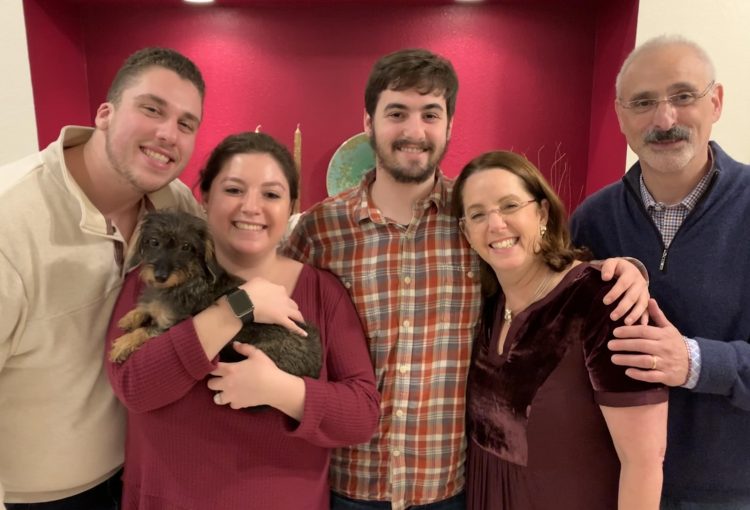For Almost 6-Year Pancreatic Cancer Survivor Josh Leuchter, Arterial Involvement Led to an Appleby Procedure
Written By Julia Brabant
March 2024
Diagnosed: December 2016
Status: Cancer Free Since 2017
For many people with pancreatic cancer, surgery represents a potential chance to do away with the disease once and for all. Yet, for the somewhere between 17% – 32% of patients whose tumors have invaded nearby arteries or veins, surgery isn’t always an immediate option.
Such was the case for Florida’s Josh Leuchter, who had experienced weight loss, a decline in appetite and ongoing mid-back pain when he decided to see his internal medicine doctor. Because of his family history of heart problems, his internist suggested he first meet with his cardiologist. The cardiologist conducted a series of tests, none of which indicated any heart issues, and recommended Josh see a gastroenterologist.
The gastroenterologist conducted a CT scan, which revealed a mass in the neck of Josh’s pancreas.
“We knew enough about pancreatic cancer because of a past experience with a cousin of mine,” Josh said. “So, we were aware of what that diagnosis meant.”
Josh’s gastroenterologist, understanding that time was of the essence, had already contacted several other doctors in the area to schedule a biopsy and get Josh on the fast-track toward treatment. However, because his tumor had wrapped around his hepatic artery, his case was a complex one.
By chance, Josh had a cousin, Sara Wilkins, who is the Director of Executive Communications at the Medical College of Wisconsin in Milwaukee, which has a world-class pancreatic cancer research program. Josh and his wife, Lisa, had sent an email to close friends and family members detailing his diagnosis and the cousin responded, recommending he come see Dr. Douglas B. Evans, M.D., Chair of the Department of Surgery at MCW, who has devoted his professional career to the research and treatment of pancreatic cancer.
Josh, Lisa and Dr. Evans spoke over the phone about the chemo regimen he’d started in Florida. They also submitted Josh’s tests and scans to the team at MCW for review. In the meantime, Josh and Lisa continued to explore their options locally but felt uneasy when they experienced a lack of responsiveness and lack of knowledge and experience in non-Whipple pancreatic surgical procedures.
“At that point, we reached out to Dr. Evans and explained that nothing was progressing,” Lisa said. “He looked at the most recent scans, and right on the phone with me, he said, ‘I think I can help you…but this is what you have to do.’”
Dr. Evans recommended Josh and Lisa relocate to Milwaukee for several months so Josh could undergo radiation and additional supportive chemotherapy treatments. The doctor outlined what margins they’d need to reach within that timeframe to make Josh’s tumor potentially operable.
As business owners, the move created a whole new onslaught of challenges, but it didn’t take Josh and Lisa long to make a decision. Within about three weeks, they were settling down in Wisconsin at the home of Sara and Lio, Josh’s cousins.
Once there, Josh had 28 radiation treatments under the direction of radiation oncologist Dr. Beth A. Erickson, M.D., while also having low-dose chemotherapy once a week to support the radiation. The treatment combination had the intended effect, shrinking Josh’s tumor enough to make surgery a possibility.
Because of the unique positioning of Josh’s tumor and the arterial involvement, Dr. Evans had to perform an Appleby procedure, rather than a Whipple. However, he wouldn’t know for sure if he could perform the operation until he confirmed the cancer hadn’t metastasized, which he did at the beginning of the procedure
Dr. Evans was able to complete the Appleby with the help of Dr. Kathleen K. Christians, M.D., and a surgical fellow. The surgery lasted nine hours and involved removing Josh’s gallbladder, spleen and 80% of his pancreas. Additionally, veins from Josh’s thigh were harvested to replace the blood vessels lost during the procedure. After, Josh’s medical team examined and measured his tumor and determined the radiation and chemotherapy treatment combo had been even more successful than they’d hoped.
In the days, weeks, months and years since his surgery, Josh has had frequent follow-up scans and tests to monitor his condition, all of which have been clear. He now has check-ups once a year. He underwent genetic testing, too, to see if he had any familial predispositions to pancreatic cancer, but the tests didn’t turn up any obvious links. He’s also had some counseling to help navigate the emotional aspects that often accompany such a diagnosis and encourages others coming to terms with their own to do the same.
“There’ve been a lot of people who’ve helped us out,” Josh said, referencing his counselors, care team, colleagues, friends and loved ones. He also expressed gratitude for his cousin at MCW who facilitated the introduction to Dr. Evans and the entire team at MCW. “We feel very lucky given the circumstances that led us to Milwaukee.”
Most of all, Josh credits Lisa for serving as his main support system along the way.
“You just have to dig deep, stay calm and be a medical advocate,” Lisa said of her caregiver role. “Ask questions, and learn what’s really going on. You don’t have to just sit back and take what you’re told.”
Josh has been cancer-free since Oct. 27, 2017.




